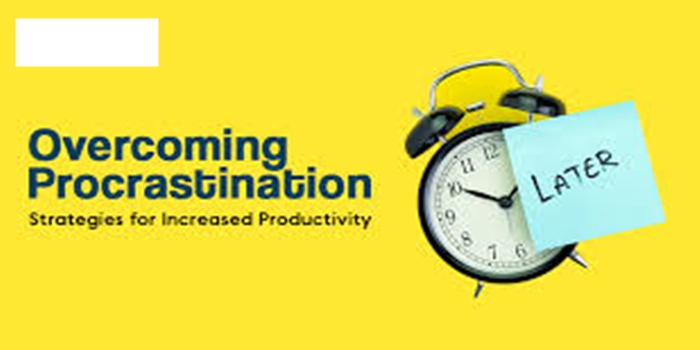In this article, we discussed procrastination, Psychological Roots, the cost of Procrastination, strategies to beat procrastination.
Definition
Procrastination is the act of delaying or postponing a task or a set of tasks. It’s frequently misunderstood as laziness, but in reality, it’s a complex psychological genius driven by various underlying factors. While it offers temporary relief from discomfort, chronic procrastination can lead to stress, missed opportunities, and negative consequences for mental and physical well-being.
Psychological Roots of Procrastination:
Fear of Failure or Success:
This is a common driver. Individuals might delay tasks because they fear not meeting expectations (their own or others’), making mistakes, or simply failing. Procrastination provides an excuse: I didn’t fail because I wasn’t capable; I failed because I didn’t start on time.”
Fear of Success: Less obvious but equally paralyzing, some people fear the implications of success, such as increased responsibility, higher expectations, or changes to their current life.
Perfectionism: The desire for a flawless outcome can lead to endless delays. Perfectionists often get stuck at the starting line, waiting for the “perfect” conditions or fearing that their work won’t be good enough. This can manifest as overthinking minor details or becoming overwhelmed by the scope of a task.
Lack of Motivation or Interest (Task Aversiveness): If a task is perceived as boring, unpleasant, or meaningless, our brains naturally seek more immediate, rewarding activities. This avoidance provides temporary gratification.
Low Self-Efficacy: A lack of belief in one’s ability to successfully complete a task can lead to avoidance. If you don’t think you can do it, why bother starting?
Impulsivity and Instant Gratification: Our brains are wired for immediate rewards. The pleasure of a distraction (social media, entertainment) can outweigh the long-term benefits of completing a challenging task. This “present bias” fuels the procrastination cycle.
Poor Emotional Regulation: Procrastination is often a coping mechanism to avoid negative emotions like anxiety, frustration, or boredom. Instead of facing these feelings, we seek temporary relief through avoidance.
Chronic procrastination can be linked to nervous conditions like ADHD, depression, or chronic stress, which affect focus, organization, and emotional regulation. In such cases, professional guidance can be invaluable.
The Cost of Procrastination:
Procrastination might offer temporary relief, but it leads to a host of long-term problems
Lower quality of work
Missed deadlines and opportunities
Increased stress and anxiety
Damaged reputation and trust
Reduced self-confidence and self-esteem
Hindered personal and professional growth
Strategies to Beat Procrastination:
Break Tasks into Smaller Pieces
Big tasks can be paralyzing. Break them down into manageable, actionable steps. Instead of “Write a research paper,” start with “Create an outline,” “Write the introduction,” etc. This makes starting less intimidating and gives you a clear roadmap.
- Use the Two-Minute Rule
If something takes less than two minutes, do it immediately. This rule, popularized by productivity expert David Allen, helps tackle small tasks and builds a sense of accomplishment that can fuel bigger actions.
- Time Blocking and Scheduling
Assign specific times to work on particular tasks. Time blocking removes ambiguity and adds structure to your day. Using a calendar or planner helps hold you accountable and prevents decision fatigue.
- Set Deadlines (Even Artificial Ones)
Create your own deadlines ahead of the actual due date. This creates a sense of urgency without the panic of last-minute rushes. Break deadlines into mini-deadlines for progressive work (e.g., research by Monday, draft by Wednesday, edit by Friday).
- Practice the Pomodoro Technique
Work in short, focused intervals (typically 25 minutes), followed by a 5-minute break. After four sessions, take a longer break. This method keeps you energized, minimizes fatigue, and encourages momentum through structure.
- Limit Distractions
Identify your main distractions—phones, social media, clutter—and eliminate them during focused work time. Use apps like Freedom, Cold Turkey, to block distracting websites and notifications.
- Use Implementation Intentions
Pre-commit to action using “If-Then” planning. For example, “If it’s 9 a.m., then I’ll start working on my proposal.” This mental association increases follow-through and reduces procrastination triggers.
- Visualize the Outcomes
Think about the benefits of completing a task and the consequences of delay. Visualizing a successful outcome can increase motivation, while considering the cost of inaction can create a healthy sense of urgency.
- Build Accountability
Tell someone your goal, or better yet, create an accountability partner. Knowing someone will check in on your progress increases your commitment and effort.
- Reward Progress, Not Perfection
Instead of only celebrating the end result, reward yourself for milestones along the way. This builds a positive feedback loop and keeps motivation high. It also reduces the perfectionism that often fuels procrastination.
Conclusion
Overcoming procrastination is a journey, not a destination. There will be setbacks, but consistency and self-awareness are the key. Beating procrastination doesn’t mean you’ll never feel the urge to delay again. It means you’ll recognize it, know how to respond, and build resilience over time. Every small action you take today is a win against tomorrow’s regrets and that’s a victory worth striving for.
READ: How to stop Procrastinating


